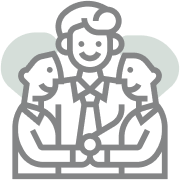Course information
Share this page
Course Programme
This course will cover the following topics:
Day 1
- Hypertension and hypercholesterolaemia: when should you start treatment in psychiatric patients?
- Type 2 diabetes mellitus: considering specific management approaches in psychiatric patient
- Weight gain in psychiatric patients: considering specific causes (including the role of psychiatric medication) and non-pharmacological and pharmacological approaches to its management
- Shortness of breath
- Smoking cessation in psychiatric patients: insight from approaches at the Maudsley Hospital
- Chest pain
- Prolonged QTc: when to take action and what to do
- Cardiac side effects of clozapine: focusing on tachycardia, postural hypotension, and myocarditis.
Day 2
- Clozapine and neutropaenia: when to act and what to do, special considerations for patients with benign ethnic neutropaenia, and specific discussion around the pros and cons of strategies to increase neutrophil counts
- Sepsis: identification and management
- Anaemia
- Weight loss: investigation thereof, and cancer screening in psychiatric patients
- Raised creatinine: the role of psychiatric medication and how renal failure may necessitate a change in your prescribing practice
- Electrolyte disturbance: causes in psychiatric patients, when to worry, and what to do about it
- Hypo- and hyper-thyroidism in psychiatric patients
- Deranged liver function tests: the role of psychiatric medication and how hepatic failure may necessitate a change in your prescribing practice
- Constipation with a particular focus on clozapine-induced gastrointestinal hypomotility
- Autoimmune encephalitis: how to identify it, and what to do when it is suspected
- Stroke: identification and management.
Learning objectives
| Describe the link between severe mental illness and major physical comorbidities | Assess common physical health conditions in patients with chronic mental illness and recommend evidence-based management |
| Determine when to refer for specialist input and identify appropriate referral pathways | Safely and effectively manage risks associated with clozapine |
Course presented by
Course schedule
Target audience
Consultant – psychiatry, CT1-3 – psychiatry, Doctors, GP, GPVTS, ST4-7 – psychiatry
Select the type of ticket you would like to purchase
Commission options

Group bookings
Contact us for bulk booking discounts on group bookings of more than 5.

Bespoke courses
We are able to offer custom-made programs, whether digital or face to face, to meet the education and training needs of your organisation in the UK or internationally. We would welcome the opportunity to discuss your requirements and develop a proposal.

Research
Let our team complete a full Training Needs Analysis for a department, directorate, or the whole hospital! We can work to complete this ourselves or work collaboratively with your own staff. Our standard outcome measures assess learner progress and produce a full report looking at wider impact of training using a range of tested assessment methodologies.


